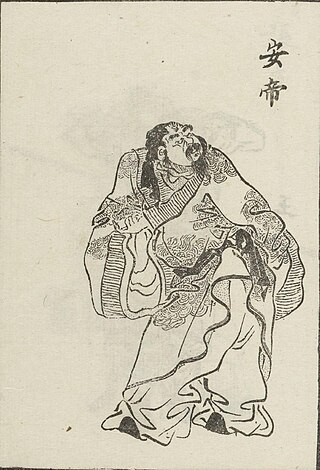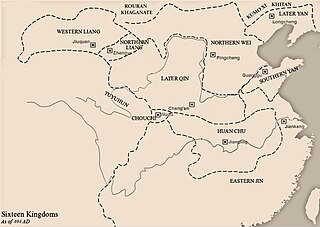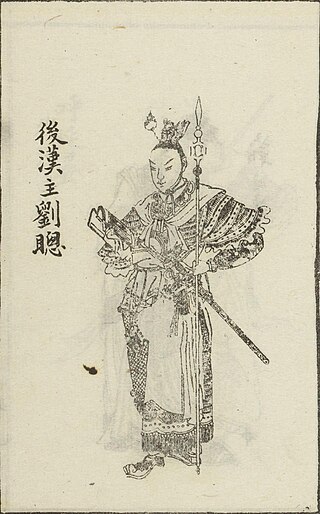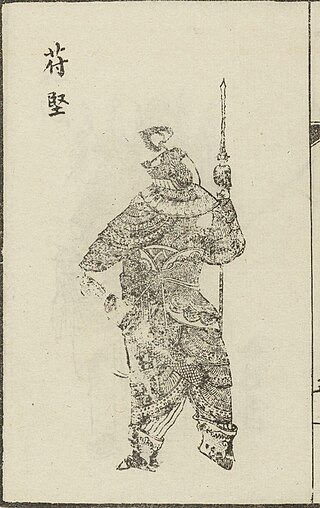
Emperor An of Jin, personal name Sima Dezong (司馬德宗), was an emperor of the Eastern Jin Dynasty (266–420) in China. He was described as so developmentally disabled that he was unable to speak, clothe himself, or be able to express whether he was hungry or full. He was created crown prince in 387 and ascended the throne in 397. Because of his disability, the actual power was controlled by his uncle, Sima Daozi, Prince of Kuaiji. During his reign, regents and warlords dominated the Jin regime. Revolts by various governors also ravaged the land. From 398 to 403, there were constant revolts and civil war campaigns. In 403, the Jin regime was usurped by the warlord Huan Xuan, and while Emperor An was restored in 404, the Jin Dynasty was nearing its end. With the warlord Liu Yu as the actual power, Jin destroyed Southern Yan and Later Qin, greatly expanding its territory. However, with Liu Yu up in the north, the renegade governor of Guang Province, Lu Xun, rebelled and threatened the capital city Jiankang, before Liu Yu returned and crushed the revolt. In 419, Emperor An was strangled under the order of Liu Yu and replaced with his brother Emperor Gong, who would be the last emperor of the dynasty, before Liu Yu took the throne and establish the Liu Song Dynasty.

Qin, known in historiography as the Later Qin or Yao Qin (姚秦), was a dynastic state of China ruled by the Yao clan of Qiang ethnicity during the Sixteen Kingdoms period in northern China. The Later Qin is entirely distinct from the Qin dynasty, the Former Qin and the Western Qin.
Qiao Zong was a Han Chinese military leader in present-day Sichuan province in China during the Eastern Jin Dynasty. He proclaimed himself the Prince of Chengdu in 405 and was given the title "Prince of Shu" by Yao Xing, ruler of the Later Qin, in 409. His state of Shu is known in historiography as Qiao Shu or Western Shu. His self-governing body coordinated offensive campaigns with Later Qin along the Yangtze River until Qiao's state was destroyed by a campaign under military subordinates of Liu Yu in 413.

Liu Cong (died 31 August 318), courtesy name Xuanming, nickname Zai, also known by his posthumous name as the Emperor Zhaowu of Han (Zhao), was an emperor of the Xiongnu-led Chinese Han-Zhao dynasty. He captured the Emperor Huai of Jin and the Emperor Min of Jin, and executed them back in Pingyang after forcing them to act as cupbearers. These raids finally forced the Jin dynasty to move its capital from Luoyang to Nanjing.
Shi Hu, courtesy name Jilong (季龍), also known by his posthumous name as the Emperor Wu of Later Zhao (後趙武帝), was an emperor of the Jie-led Chinese Later Zhao dynasty. He was the founding emperor Shi Le 's distant nephew and adoptive brother, who took power in a coup after Shi Le's death from Shi Le's heir Shi Hong. Due to Tang dynasty naming taboo, he is referred to as Shi Jilong (石季龍) in the Book of Jin.

Fu Jian, courtesy name Yonggu (永固) or Wenyu (文玉), also known by his posthumous name as the Emperor Xuanzhao of Former Qin (前秦宣昭帝), was the third monarch of the Di-led Chinese Former Qin dynasty, ruling as Heavenly King. Under his reign, the Former Qin unified Northern China by conquering the Former Yan, Chouchi, Former Liang, and Dai, as well as the Eastern Jin's Yi Province, until he was repelled at the Battle of Fei River in 383. Following this defeat, the Former Qin state disintegrated and Fu was assassinated in 385 by Yao Chang, his former subordinate who then founded the Later Qin dynasty. He was considered by traditional histories to be a virtuous and just ruler, who, ironically, by sparing too many of his enemies after defeating them, led to his own downfall.
Huan Wen (桓溫), courtesy name Yuanzi (元子), formally Duke Xuanwu of Nan Commandery (南郡宣武公), was a general and regent of the Jin Dynasty (266–420), as well as the leader of Huan clan of Qiaoguo (谯国桓氏). He is commonly viewed as one of the greatest generals since Jin's loss of northern China, as he led the campaign that destroyed Cheng-Han and annexed its lands to Jin, and had some successes against the northern states Former Qin and Former Yan. After his death, the Huan clan would be entrenched in the Jin power struction for decades, after his son Huan Xuan temporarily usurped the Jin throne in 403 as the emperor of Chu (楚), he was posthumously honored as Emperor Xuanwu of Chu with the temple name of Taizu (太祖).

Yao Chang, courtesy name Jingmao (景茂), also known by his posthumous name as the Emperor Wuzhao of Later Qin (後秦武昭帝), was the founding emperor of the Qiang-led Chinese Later Qin dynasty. His father Yao Yizhong had been a powerful general and Qiang chieftain under the Later Zhao emperor Shi Hu, but after Later Zhao's collapse after Shi Hu's death, Yao Chang's older brother Yao Xiang tried to start an independent state but was defeated and killed by Former Qin forces. Yao Chang became a Former Qin general, but after an incident in 384 after the Former Qin emperor Fu Jiān's defeat at the Battle of Fei River, Yao Chang feared that Fu Jiān would kill him and therefore rebelled. He subsequently captured and killed Fu Jiān, who had saved his life when Yao Xiang was defeated, causing many historians to view him as a traitor and murderer.
Yao Xing, courtesy name Zilüe (子略), also known by his posthumous name as the Emperor Wenhuan of Later Qin (後秦文桓帝), was an emperor of the Qiang-led Chinese Later Qin dynasty. He was the son of the founding emperor Yao Chang. For most of his reign, he did not use the title of emperor, but used the title Heavenly King. During his reign, he destroyed the rival Former Qin and proceeded to expand his hegemony over nearly all of western China, as he temporarily seized all of Western Qin's territory and forced Southern Liang, Northern Liang, Western Liáng, and Qiao Zong's Western Shu (西蜀) all to at least nominally submit to him, but late in his reign, defeats on the battlefield, particularly at the hands of the rebel general Helian Bobo, and internecine struggles between his sons and nephews greatly damaged the Later Qin state, and it was destroyed soon after his death. Yao Xing was an avid Buddhist, and it was during his reign that Buddhism first received official state support in China. The monk Kumarajiva also visited Chang'an at Yao Xing's request in 401.
Murong Chao, courtesy name Zuming (祖明), was the second and last emperor of the Xianbei-led Chinese Southern Yan dynasty. He was the nephew of the founding emperor Murong De who was trapped under the rule of the Later Qin dynasty, but was welcomed to the Southern Yan after his uncle found out about his existence. Because Murong De had no surviving sons, Murong Chao inherited his throne after his death in 405. Initially considered able, Murong Chao turned out to be capricious and thoroughly unwilling to accept criticism once he became emperor, and after he provoked the Eastern Jin dynasty, the Eastern Jin general Liu Yu captured and killed him in 410, ending the Southern Yan. The Book of Jin described Murong Chao as a handsome man about 1.96 metres tall.
Lü Long, courtesy name Yongji (永基), was the last ruler of the Di-led Chinese Later Liang dynasty. He was the nephew of the founding emperor Lü Guang, and he took the throne after his brother Lü Chao (呂超) assassinated the emperor Lü Zuan in 401 and offered the throne to him. During his reign, Later Liang was under constant attacks by Northern Liang and Southern Liang and reduced largely to its capital Guzang. In 403, Lü Long decided to end the state by surrendering Guzang to Later Qin's emperor Yao Xing. He became a Later Qin official, but after aligning himself with Yao Xing's son Yao Bi (姚弼), who made unsuccessful attempts to seize the crown prince position from Yao Hong, was executed by Yao Hong after Yao Xing's death in 416.

Emperor Mingyuan of Northern Wei ( 魏明元帝), Chinese name Tuoba Si (拓拔嗣), Xianbei name Mumo (木末), was an emperor of the Xianbei-led Northern Wei dynasty of China. He was the oldest son of the founding emperor Emperor Daowu. During his reign, Northern Wei's territory did not expand as much as it did under either his father's reign or the reign of his son Emperor Taiwu, but he helped the state stabilize over northern China, and started the tradition of meeting with important imperial officials to listen to their advice and make final decisions. He is generally regarded by historians to be an intelligent and rational ruler.
Helian Bobo, né Liu Bobo (劉勃勃), courtesy name Qujie (屈孑), also known by his posthumous name as the Emperor Wulie of Xia (夏武烈帝), was the founding emperor of the Xiongnu-led Hu Xia dynasty of China. He is generally considered to be an extremely cruel ruler, one who betrayed every benefactor whom he had, and whose thirst for killing was excessive even for the turbulent times that he was in. He built an impressive capital for his state at Tongwancheng that remained difficult to besiege, even hundreds of years later during the Five Dynasties and Ten Kingdoms period.
Juqu Mengxun, also known by his posthumous name as the Prince Wuxuan of Northern Liang (北涼武宣王), was the second prince of the Xiongnu-led Chinese Northern Liang dynasty, and the first from the Juqu clan. His cousin Juqu Nancheng (沮渠男成) and he initially supported Duan Ye as prince of Northern Liang in 397 after rebelling against the Later Liang dynasty, but in 401, Juqu Mengxun tricked Duan Ye into wrongly executing Juqu Nancheng, and then used that as an excuse to attack and kill Duan Ye, taking over the throne himself. While he maintained his own state, he also nominally served as a vassal of the Later Qin, Eastern Jin, and Northern Wei dynasties. He was considered a capable ruler when he was young, but in his old age was considered cruel and arbitrary.

Emperor Wu of (Liu) Song, personal name Liu Yu (劉裕), courtesy name Dexing (德興), childhood name Jinu (寄奴), was a statesman and strategist of Imperial China, and the founding emperor of the Chinese Liu Song dynasty. He came from a humble background, but became prominent after leading a rebellion in 408 to overthrow Huan Xuan, who had usurped the Eastern Jin throne in 403. After that point, using a mixture of political and military skills, Liu Yu gradually concentrated power in his own hands while expanding Jin's territory. In 420, he forced Emperor Gong of Jin to yield the throne to him, thus ending the Eastern Jin dynasty and establishing the Liu Song dynasty. He ruled only briefly, for two years, before dying and passing the throne to his son, Emperor Shao of Liu Song. An outstanding commander, perhaps the greatest of his era, he conquered two of the Sixteen Kingdoms and remained undefeated throughout his military career. The History of the Southern Dynasties described Liu Yu as seven chi and six cun tall
Xu Xianzhi (徐羨之), courtesy name Zongwen (宗文), was a high-level official of the Chinese Liu Song dynasty, who, along with his colleagues Fu Liang and Xie Hui, deposed Emperor Shao after the death of Emperor Wu due to their belief that Emperor Shao was not fit to be emperor. When Emperor Shao's brother Emperor Wen subsequently wanted to kill him, he committed suicide.

Tan Daoji was a high-level general of the Chinese Liu Song dynasty. He was one of the most respected generals during the Southern and Northern Dynasties era. Because of this, however, he was feared by Emperor Wen and even more so by Emperor Wen's brother, the prime minister Liu Yikang the Prince of Pengcheng, and during an illness of Emperor Wen, Liu Yikang had Tan arrested and executed on false accusations of treason.
The Sixteen Kingdoms, less commonly the Sixteen States, was a chaotic period in Chinese history from AD 304 to 439 when northern China fragmented into a series of short-lived dynastic states. The majority of these states were founded by the "Five Barbarians", non-Han peoples who had settled in northern and western China during the preceding centuries, and had launched a series of rebellions against the Western Jin dynasty in the early 4th century. However, several of the states were founded by the Han people, and all of the states—whether ruled by Xiongnu, Xianbei, Di, Jie, Qiang, Han, or others—took on Han-style dynastic names. The states frequently fought against both one another and the Eastern Jin dynasty, which succeeded the Western Jin in 317 and ruled southern China. The period ended with the unification of northern China in 439 by the Northern Wei, a dynasty established by the Xianbei Tuoba clan. This occurred 19 years after the Eastern Jin collapsed in 420, and was replaced by the Liu Song dynasty. Following the unification of the north by Northern Wei, the Northern and Southern dynasties era of Chinese history began.

Singing All Along is a 2016 Chinese television series produced by Ruby Lin, starring Lin and Yuan Hong. Set in 1st-century imperial China, the drama is based on Li Xin's (李歆) 2007–2009 romantic novel series Xiuli Jiangshan (秀丽江山) and focuses on the relationship between Liu Xiu, a peasant-turned-Eastern Han dynasty founder, and Yin Lihua, the love of his life. Although the original novel involved time travel, the television series does not contain those parts.
Dou Chong was a Di military general and ruler of Former Qin during the Sixteen Kingdoms period. Dou Chong rose to prominence after the Battle of Feishui in 383, remaining loyal to Fu Jian after most of Qin's generals had betrayed the state and becoming a key general. Dou Chong continued his service with Qin under Fu Pi and Fu Deng, but by 393, despite receiving much favour from Fu Deng, he rebelled and declared himself the King of Qin. Dou Chong's Qin only lasted for a year before he was defeated and captured by Later Qin.








